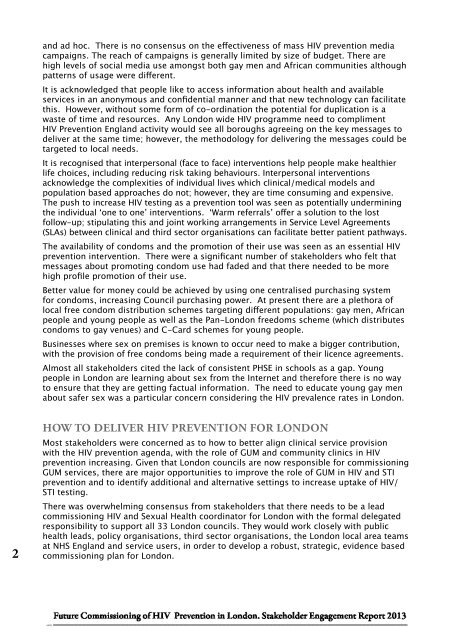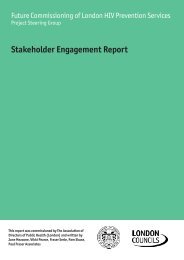Stakeholder Engagement Report - London Councils
Stakeholder Engagement Report - London Councils
Stakeholder Engagement Report - London Councils
You also want an ePaper? Increase the reach of your titles
YUMPU automatically turns print PDFs into web optimized ePapers that Google loves.
and ad hoc. There is no consensus on the effectiveness of mass HIV prevention media<br />
campaigns. The reach of campaigns is generally limited by size of budget. There are<br />
high levels of social media use amongst both gay men and African communities although<br />
patterns of usage were different.<br />
It is acknowledged that people like to access information about health and available<br />
services in an anonymous and confidential manner and that new technology can facilitate<br />
this. However, without some form of co-ordination the potential for duplication is a<br />
waste of time and resources. Any <strong>London</strong> wide HIV programme need to compliment<br />
HIV Prevention England activity would see all boroughs agreeing on the key messages to<br />
deliver at the same time; however, the methodology for delivering the messages could be<br />
targeted to local needs.<br />
It is recognised that interpersonal (face to face) interventions help people make healthier<br />
life choices, including reducing risk taking behaviours. Interpersonal interventions<br />
acknowledge the complexities of individual lives which clinical/medical models and<br />
population based approaches do not; however, they are time consuming and expensive.<br />
The push to increase HIV testing as a prevention tool was seen as potentially undermining<br />
the individual ‘one to one’ interventions. ‘Warm referrals’ offer a solution to the lost<br />
follow-up; stipulating this and joint working arrangements in Service Level Agreements<br />
(SLAs) between clinical and third sector organisations can facilitate better patient pathways.<br />
The availability of condoms and the promotion of their use was seen as an essential HIV<br />
prevention intervention. There were a significant number of stakeholders who felt that<br />
messages about promoting condom use had faded and that there needed to be more<br />
high profile promotion of their use.<br />
Better value for money could be achieved by using one centralised purchasing system<br />
for condoms, increasing Council purchasing power. At present there are a plethora of<br />
local free condom distribution schemes targeting different populations: gay men, African<br />
people and young people as well as the Pan-<strong>London</strong> freedoms scheme (which distributes<br />
condoms to gay venues) and C-Card schemes for young people.<br />
Businesses where sex on premises is known to occur need to make a bigger contribution,<br />
with the provision of free condoms being made a requirement of their licence agreements.<br />
Almost all stakeholders cited the lack of consistent PHSE in schools as a gap. Young<br />
people in <strong>London</strong> are learning about sex from the Internet and therefore there is no way<br />
to ensure that they are getting factual information. The need to educate young gay men<br />
about safer sex was a particular concern considering the HIV prevalence rates in <strong>London</strong>.<br />
2<br />
How to deliver HIV prevention for <strong>London</strong><br />
Most stakeholders were concerned as to how to better align clinical service provision<br />
with the HIV prevention agenda, with the role of GUM and community clinics in HIV<br />
prevention increasing. Given that <strong>London</strong> councils are now responsible for commissioning<br />
GUM services, there are major opportunities to improve the role of GUM in HIV and STI<br />
prevention and to identify additional and alternative settings to increase uptake of HIV/<br />
STI testing.<br />
There was overwhelming consensus from stakeholders that there needs to be a lead<br />
commissioning HIV and Sexual Health coordinator for <strong>London</strong> with the formal delegated<br />
responsibility to support all 33 <strong>London</strong> councils. They would work closely with public<br />
health leads, policy organisations, third sector organisations, the <strong>London</strong> local area teams<br />
at NHS England and service users, in order to develop a robust, strategic, evidence based<br />
commissioning plan for <strong>London</strong>.




